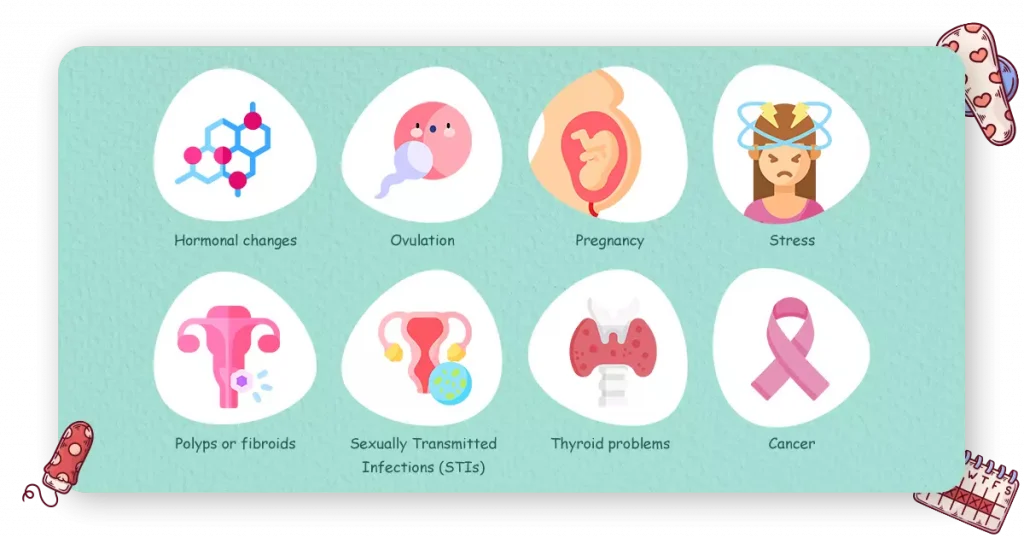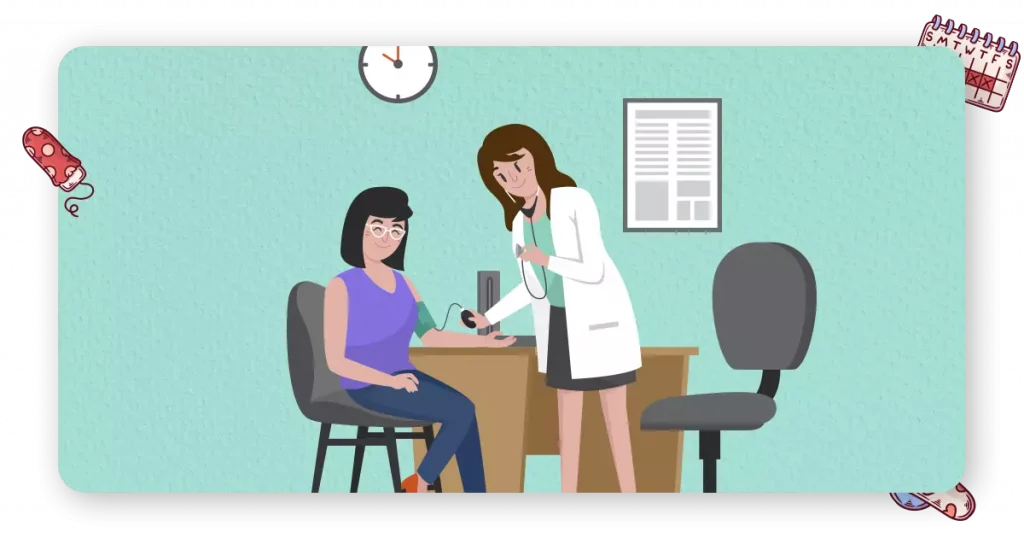Spotting a Week Before Period – Common Causes, Colour Variations, and When to Get Medical Help

Hey there ladies! Today, let’s talk about spotting a week before the period. We’ve all…
Hey there ladies! Today, let’s talk about spotting a week before the period. We’ve all been there. You know that experience when you notice brown discharge or spots of blood in your underwear even though your period is still a week away? That’s what we are talking about.
Many women experience spotting a week before their period, and it can be rather confusing and frustrating when you don’t know why this is happening. This brings us to the pivotal question – why does spotting happen a week before periods?
Well, the reasons can be anything from pregnancy or hormonal changes to infections or fibroids. It is integral to identify the precise cause so that you can address any health concerns and seek treatment if necessary.
Like I said before, many women experience spotting before their periods and it is nothing to be ashamed of. Let’s dive deeper into this topic and find out its causes and when to seek medical help.
Exploring the Causes of Spotting a Week Before Period
You think you’re in the clear, and then bam! A little bit of blood shows up uninvited. But what causes this annoying spotting? Here are a few possible causes:

1. Hormonal changes
Throughout the menstrual cycle, hormonal levels constantly fluctuate, and sometimes this can cause spotting. It’s like an indication that your periods are almost here.
2. Ovulation
When the body releases an egg from the ovary, associated hormonal changes may cause spotting. Some birth control measures such as IUDs or pills are also known to cause spotting
3. Pregnancy
Implantation is a key phase in early pregnancy when a fertilized egg implants itself in the uterus. This implantation process may lead to light bleeding in some women.
4. Stress
Yes. Good old stress can wreak havoc on our bodies in unimaginable ways. High-stress levels can trigger imbalances that, in turn, can lead to spotting before periods. So take a deep breath and try relaxation techniques such as deep breathing exercises.
5. Polyps or fibroids
Most women these days complain of fibroids or polyps. These are basically non-cancerous growths that form in the cervix or the uterus and cause spotting or irregular bleeding.
5. Polyps or fibroids
Most women these days complain of fibroids or polyps. These are basically non-cancerous growths that form in the cervix or the uterus and cause spotting or irregular bleeding.
6. Sexually Transmitted Infections (STIs)
Did you know that certain STIs such as chlamydia, gonorrhea, and trichomoniasis can cause spotting? An STI screening test can help rule out the possibility.
7. Thyroid problems
Your thyroid can mess up your hormonal levels when it is underactive or overactive. Irregularities in thyroid secretion can often cause spotting..
8. Cancer
Although not very common, spotting can sometimes point to cervical or uterine cancer. If cancer tends to run in your family or if you are experiencing abnormal episodes of discharge, seek medical attention immediately.
Colors to Check for in Spotting
Interestingly, the color of spots can give you clues about what may be causing it. Let’s decipher the color of spotting and its possible causes.

Pink or light red
This is the most common color of spotting reported by women and it usually indicates implantation bleeding or hormonal fluctuations.
Brown
When spotting occurs in brown color, it points to old blood that has been within the body for a while. At times, this may also happen when the uterus sheds its old tissues.
Dark Red
This color indicates an infection, fibroid, or polyp.
Black
Black color spotting is a sign of blood that has been in the uterus for quite some time.
Orange or Gray
Spotting in these colors accompanied by foul-smelling discharge may indicate an infection.
When to Seek Medical Help
Although spotting a week before your period is usually normal, there are some instances where you might want to seek medical help. Here are a few red flags to keep in mind:

Spotting that lasts longer than a week
Spotting that lasts for a few days is generally okay. But if it extends to more than a week, consult your doctor at once
Heavy bleeding
Is your bleeding so heavy that you need to change your pad or tampon every hour? You definitely need to see a doctor.
Severe cramps
If your cramps or abdominal pain do not subside with over-the-counter painkillers, consider seeking medical help.
Foul-smelling discharge
When your discharge smells unusually odd or foul, it could indicate an underlying health condition like an infection. Don’t take a chance. Visit a doctor right away.
Spotting After Sex
If you notice spotting after sex on a regular basis, do not ignore it. This is something your doctor needs to know.
Spotting During Pregnancy
Spotting during pregnancy is not uncommon. However, since it is clearly not the time to take risks, consult your gynecologist to rule out any complications.
A History of Cancer or Bleeding Disorders
If your family has a history of cancer, spotting could be a bad sign. Visit your doctor for a screening to ensure that you are fine.
In case you notice any of the above symptoms, make an appointment with your gynecologist right away. They can accurately determine the cause of spotting and suggest necessary treatment.
Summing up
So as you can see, spotting a week before your period is fairly common and not usually a cause for concern. However, it is vital to be aware of the causes and colors of spotting to recognize any serious problems that may need medical attention. In case you notice any unusual or alarming symptoms, do not hesitate to seek medical help.
For those who regularly experience spotting before your period, there are a few things you can do to ease your mind. Keeping track of your menstrual cycle and noting down spotting episodes can be useful in identifying patterns. A few other tips for managing spotting include drinking adequate water, avoiding the use of harsh soaps to clean your intimate area, using panty liners, ensuring a balanced diet, and keeping stress levels low with meditation or yoga.
So the next time you notice spotting a week before your period, don’t jump to conclusions just yet. Remind yourself that spotting is a normal part of the menstrual cycle and need not cause unnecessary anxiety. But if your instincts indicate that something is wrong, go ahead and seek medical attention. In the meantime, remember to take care of yourself and listen to your body’s needs.

